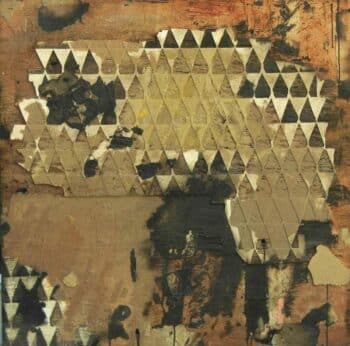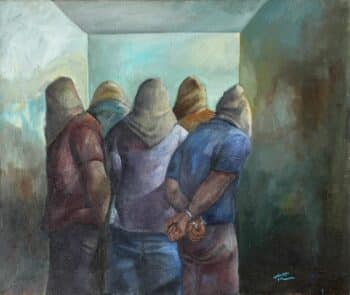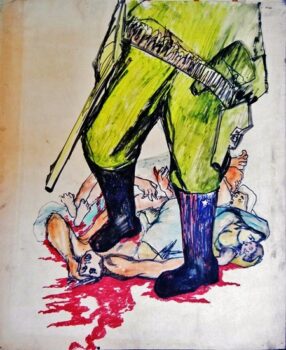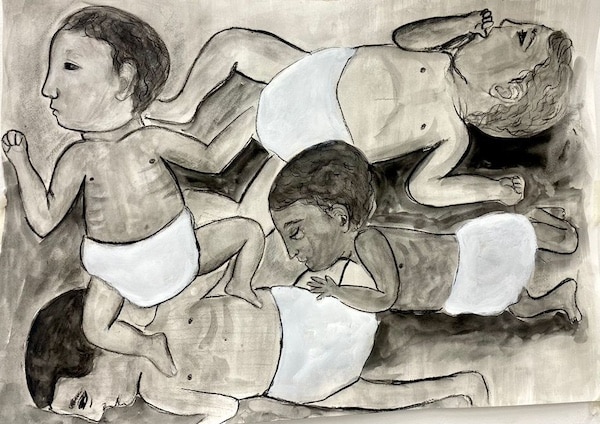Dear friends,
Greetings from the desk of Tricontinental: Institute for Social Research.

Hanaa Malallah (Iraq), The Looting of the Museum of Art, 2003.
The indecency of the phrase ‘humanitarian pause’ is obvious. There is nothing humanitarian about a brief interlude between bouts of horrendous violence. There is no true ‘pause’, merely the calm before the storm continues. We are witnessing the bureaucratisation of immorality, the use of old words with great meaning (‘humanitarian’) and their reduction to new, empty phrases that betray their original meanings. Before the debris from the first rounds of Israeli bombs could be cleared, the bombing resumed just as viciously as before.
The word ‘humanitarian’ has been severely bruised by the West. You might remember another phrase, ‘humanitarian intervention’, that was used as cover for the destruction of Libya in 2011 after the legitimacy of Western military intervention had been eviscerated by the illegal U.S. invasion of Iraq in 2003. To rehabilitate this legitimacy, the West pushed the United Nations to hold a conference that resulted in a new doctrine, Responsibility to Protect (R2P), which, while purporting to ‘ensure that the international community never again fails to halt the mass atrocity crimes of genocide, war crimes, ethnic cleansing and crimes against humanity’, instead provided the West with a UN Security Council mandate (under Chapter VII of the UN Charter) for the use of force. The attack on Libya in 2011 took place under this doctrine. The guise of humanitarianism was used to destroy the Libyan state and throw the country into what appears to be a permanent civil war. There has never been even a whiff of R2P when it comes to the Israeli bombardment of Gaza (not in 2008—09, not in 2014, and not now).
It does not seem to matter that more Palestinians have been displaced and killed by Israel since 7 October than were displaced and killed in the Nakba (‘Catastrophe’) of 1948. If the word ‘humanitarian’ meant something in 1948, it certainly does not mean much now.
As the numbers of the dead and displaced increase, a sense of numbness grows. It began with a hundred dead, then a hundred more, and is rapidly escalating into the tens of thousands. In Iraq, approximately a million people were killed by the U.S. onslaught, the sheer scale of death and the anonymity surrounding it forcing a sense distance from the rest of the world. It is difficult to wrap one’s head around these numbers unless there are stories attached to each of the dead and displaced.

Abdel Rahman al-Muzayen (Palestine), Untitled, 2000.
Part of the problem here is that the international division of humanity makes for unjust accounting of human life: were the Palestinians killed in Gaza treated with as much dignity as the Israelis killed on 7 October? Are their lives, and deaths, assigned equal worth? The uneven response to these deaths, alongside the uncritical acceptance of this unevenness, suggests that this international division of humanity remains in place and is not only accepted, but also perpetuated, by Western leaders, who make allowances for the killing of more brown bodies than white ones, the latter seen as precious, the former seen as disposable.
During the ‘humanitarian pause’, a hostage transfer took place through which Hamas and the Palestinian factions released 110 Israelis while Israel released 240 Palestinian women and children. The stories of the Israeli casualties, many of them residents of settlements near the Gaza perimeter fence, and other hostages such as the Thai and Nepalese fieldworkers are now well-known. Less frequently discussed and much less understood are the stories of the Palestinian casualties. Equally disregarded is the fact that after 7 October, Israel launched a mass campaign to detain over 3,000 Palestinians, including nearly 200 children. There are more Palestinians in Israeli prisons now than before 7 October. During the first four days of the truce alone, Israel arrested almost as many Palestinians as it released through the hostage transfer.
It is of note that most (more than two-thirds) of the Palestinians released from Israeli prisons are never charged with any crime and have been held in ‘administrative detention’ in the military’s legal system, meaning that they are held without a time limit, ‘without trial [and] without having committed an offence, on the grounds that he or she plans to break the law in the future’, as defined by the human rights organisation B’tselem. Some of them have been lost in the maze of the Israeli incarceration system indefinitely, unable to exercise even the most basic right of habeas corpus, with no court appearance, no access to a lawyer, and no access to the evidence against them. Israel currently holds more than 7,000 Palestinian political prisoners, many of them associated with left-wing factions (such as the Popular Front for the Liberation of Palestine and the Democratic Front for the Liberation of Palestine). More than 2,000 of these prisoners are being held in administrative detention.

Sliman Mansour (Palestine), Prison, 1982.
Many of these Palestinian prisoners are children. Many of them spend years in the Israeli system, often under administrative detention, unable to make a case for their release. The Defence for Children International (Palestine) reports that 500—700 children are detained each year, and a chilling report from the United Nations Children’s Fund (UNICEF) in 2015 showed that Israel is in full violation of the UN Convention on the Rights of the Child (1990). Article 37 of the convention says that the ‘arrest, detention, or imprisonment of a child shall be in conformity with the law and shall be used only as a measure of last resort and for the shortest appropriate period of time’. As multiple cases show, Israel uses arrests as a measure of first resort and holds children for long periods of time.
Defence for Children International studied sworn affidavits from 766 child detainees from the occupied West Bank arrested between 1 January 2016 and 31 December 2022. The following data emerged from their analysis:
- 75% were subjected to physical violence.
- 80% were strip-searched.
- 97% were interrogated without a family member present.
- 66% were not properly informed of their rights.
- 55% were shown or made to sign a paper in Hebrew, a language most Palestinian children do not understand.
- 59% were arrested at night.
- 86% were not informed of the reason for their arrest.
- 58% were subjected to verbal abuse, humiliation, or intimidation during or after their arrest.
- 23% were detained in solitary confinement for interrogation purposes for a period of two or more days.

Hakim Alakel (Yemen), from the series The Eye of the Bird, 2013.
There are thousands of untold stories of the brutality inflicted upon Palestinian children. One of them, Ahmad Manasra, was arrested on 12 October 2015 at the age of thirteen in occupied East Jerusalem on the charge that he stabbed two Israelis: Yosef Ben-Shalom, a twenty-year-old security guard, and Naor Shalev Ben-Ezra, a thirteen-year-old boy, who survived the attack. The Israeli courts initially found Ahmad guilty of the stabbing but then changed their opinion to say that his fifteen-year-old cousin Hassan Khalid Manasra, who was shot dead at the scene, had stabbed the two Israelis. There was no evidence of Ahmad’s complicity, yet he was sentenced to nine-and-a-half years in prison.
Still in prison, Ahmad Manasra (now 21) has been held in solitary confinement for months on end. Khulood Badawi of Amnesty International said in late September that Ahmad ‘was taken to the mental health unit at Ayalon prison after spending the better part of two years in solitary confinement. The Israeli Prison Service has requested an extension of Ahmad’s isolation for another six months in brazen violation of international law. Prolonged solitary confinement lasting more than 15 days violates the absolute prohibition of torture and other cruel, inhuman, or degrading treatment’.
Ahmad’s case took place during a wave of what were called ‘knife attacks’, when young Palestinians were accused of rushing at Israeli military posts with knives and were then shot dead. At that time, I investigated several of these attacks and found them to be based on little more than the word of Israeli soldiers. For instance, on 17 December 2015, Israeli soldiers at the Huwwara checkpoint shot fifteen-year-old Abdullah Hussein Ahmad Nasasra to death. Eyewitnesses told me that the boy had his hands in the air when he was fatally shot. One of them, Nasser, told me that there was no knife, and that he ‘saw them kill the boy’. Kamal Badran Qabalan, an ambulance driver, was not allowed to retrieve the body. The Israelis wanted control over the body and the story they would tell about it.
Another story is that of twenty-three-year-old Anas al-Atrash in Hebron. Anas and his brother Ismail returned home from a week of work in Jericho, their car filled with fruits and vegetables. At a checkpoint, Anas got out of the car when instructed to do so and an Israeli soldier shot him dead. The next morning, Israeli media reported that Anas tried to kill the Israeli soldiers. The journalist Ben Ehrenreich, who reported the story with a fierce determination for the truth, sought out the family’s version. Anas had no interest in politics, they told him. He was studying accounting and hoped to get married soon. The Israeli soldiers and intelligence officials kept asking Ismail if his brother had a knife. There was simply no knife. Anas had been killed in cold blood. ‘This is a savage country’, an eyewitness told Ehrenreich. ‘They have no shame’. He meant the Israeli soldiers.
The grammar of the Israeli occupation is to put pressure on Palestinians until an act of violence takes place—a knife attack, say, or even a fabricated knife attack—and then use that event as an excuse to deepen the displacement of Palestinians with more illegal settlements. The events that have followed 7 October maintain this logic. Israel has used people like Anas, Abdullah, and Ahmad, and the fabricated narratives surrounding their alleged crimes, as the raison d’etre to increase the demolition of Palestinian homes and expand illegal Israeli settlements, accelerating the Permanent Nakba.
Ten years ago, I met with Professor Nadera Shalhoub-Kevorkian, who teaches at Hebrew University of Jerusalem. Shaloub-Kevorkian studies how the occupation produces an everyday form of victimhood that stretches from the streets to Palestinians’ most intimate of spaces. Her book Security Theology, Surveillance, and the Politics of Fear (2015) provides a glimpse into the industry of fear that is produced and reproduced in the everyday violence inflicted upon Palestinians by settlers and the military, including the difficulties that Palestinians face in giving birth and burying their dead. The depth of the violence and uncertainty, Shalhoub-Kevorkian writes, moves Palestinian women to speak of ‘being choked, suffocated, or gagged’ and has led many of their children to lose their will to live. There is widespread social trauma in Palestine or what Shalhoub-Kevorkian calls ‘sociocide’: the death of society.

Abdul Rahim Nagori (Pakistan), Sabra and Shatila, 1982.
More than fifty years of an occupation and war have created a strange dynamic. Both Ehrenreich and Shalhoub-Kevorkian’s work offer windows into this madness. Shalhoub-Kevorkian, who lives in Jerusalem, told me that she is part of a group of women who walk Palestinian children to school each day, since it is too dangerous for them to confront the police and the settlers on their own, or even in the company of their Palestinian family and friends. ‘Bikhawfuni!’ (‘They scare me!’), one girl, Marah (age 8), told her.
The children draw pictures at school. One of them drew a clown, a Palestinian clown. When Shalhoub-Kevorkian asked the child (age 9) what a Palestinian clown is, he explained, ‘This is a Palestinian clown. Clowns in Palestine cry’.
The poet Faiz Ahmed Faiz, who moved to Beirut to edit the magazine Lotus in the aftermath of the 1977 military coup in Pakistan, wrote with horror about the plight and struggles of the Palestinians:
Tere aaqa ne kiya ek Filistin barbaad
Mere zakhmon ne kiye kitne Filistin aabaad.Your enemies destroyed one Palestine.
My wounds populated many Palestines.
Faiz’s poem ‘A Lullaby for a Palestinian Child’, written during the Israeli invasion of Lebanon in 1982, reflects the reality facing Palestinian children today:
Don’t cry children.
Your mother has just cried herself to sleep.Don’t cry children.
Your father has just left this world of sorrow.Don’t cry children,
Your brother is in an alien land.
Your sister too has gone there.Don’t cry children.
The dead sun has just been bathed and the moon is buried in the courtyard.Don’t cry children.
For if you cry,
Your mother, father, brother, and sister
And the sun, and the moon
Will make you cry ever more.Maybe if you smile,
They’ll one day return, disguised
to play with you.
Warmly,
Vijay

